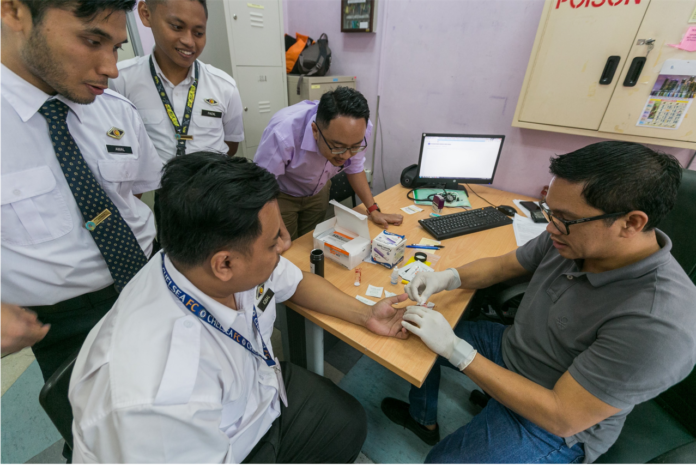Kuala Lumpur, 3 August 2021 – FIND, the global alliance for diagnostics, is partnering with the Ministry of Health (MoH) Malaysia, the Malaysian AIDS Council (MAC), World Health Organization (WHO) and the Drugs for Neglected Diseases initiative (DNDi) to launch a hepatitis C virus self-testing impact study in Malaysia.
Shared ahead of World Hepatitis Day 2021, the impact study announcement was made during the webinar Hepatitis C can’t wait, Malaysia isn’t waiting – following WHO advisory of the new hepatitis C virus self-testing recommendations shared at the International AIDS Society (IAS) Conference.
Earlier in June, Malaysia announced the conditional approval for ravidasvir to treat hepatitis C. Being part of this global hepatitis C self-testing impact study solidifies Malaysia’s commitment to eliminate hepatitis C by 2030. It is estimated that there are more than 400,000 people living with hepatitis C in Malaysia, but only 1% of them have been treated. Since the end of 2019, Malaysia has adopted decentralized care for hepatitis C by enabling primary healthcare facilities to test and treat the disease.
Datuk Dr Muhammad Radzi Abu Hassan, National Head of Gastroenterology and Hepatology, Ministry of Health shared: “Through this impact study, we will be able to understand if self-testing can increase testing uptake among people currently not reached by facility-based testing, which can expand equity and access in hepatitis C care.”
Set to be conducted in partnership with a community-based organization – the Malaysian AIDS Council (MAC) – the impact study will build on existing work done for HIV self-testing, via the online platform JOM TEST, and is aimed to test those who may be missed by the usual facility-based testing.
“Testing continues to play a crucial part of hepatitis C treatment, enabling those tested to receive proper care,” said Datuk Dr Christopher Lee, President of Malaysian AIDS Council. “We are proud to assist in this impact study to understand the impact of providing self-testing as an additional approach for diagnosis to help stop anyone from falling through the cracks, denying their access to treatment.”
Tan Sri Dato’ Seri Dr Noor Hisham Abdullah, Director General, Ministry of Health, Malaysia said, “Malaysia is proud to be at the cutting edge of innovations to tackle hepatitis C, and all this is possible because where there is a will, there is always a way. We are happy to be granted opportunities to work together with partners such as FIND, DNDi, MAC, and WHO to reach our goal of hepatitis C elimination by 2030.”
Dr Meg Doherty, Director, Global HIV, Hepatitis, STI Programmes, WHO said, “We congratulate Malaysia’s swift action in responding to the WHO global launch of the first HCV self-testing guidelines, announced at the International AIDS Society Conference 2021 on 18 July 2021. This has implications for scaling-up testing coverage among key and vulnerable populations as well as among groups with a higher burden on hepatitis C virus infections and can facilitate national action towards elimination of the disease by 2030.”
Dr Bill Rodriguez, CEO of FIND said, “Hepatitis C continues to be a public health concern for most countries in the world. By implementing this self-testing study so soon after the new guidelines have been released, Malaysia is once again leading the way in assessing strategies that can defeat this disease, providing information that will be critical not only for Malaysia but also for many other countries. It is a privilege to be part of this partnership that is so committed to disease elimination.”
“Hepatitis C virus is unique because we can design effective public health strategies of elimination with affordable treatments,” said Jean-Michel Piedagnel, Director of DNDi South-East Asia. “After the announcement of the conditional approval for ravidasvir, this study continues to put Malaysia on the map as a warrior against hepatitis C. We are proud to be part of a team that continues to innovate on screening strategies to make elimination possible.
World Hepatitis Day takes place every year on 28 July with a purpose to raise awareness of the disease. Hepatitis C is a silent disease, as the huge majority of those infected are not aware of their status, show no symptoms of the disease, and therefore do not seek treatment.
